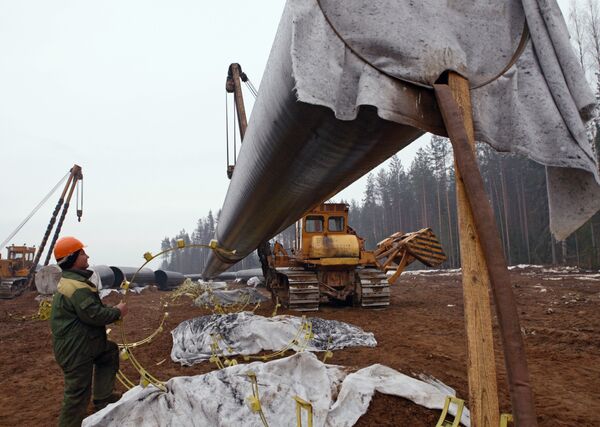Nord Stream has secured 3.9 billion euros ($5.3 billion) in financing allowing it to start building a pipeline to pump Russian natural gas to Europe under the Baltic Sea, The Financial Times reported on Tuesday.
The funds will come from 26 banks with loan guarantees secured for 80% of the financing from the Italian and German credit agencies Sace and Hermes, the paper said.
Paul Corcoran, Nord Stream's chief financial officer, told the paper the pipeline now had everything in place to begin construction next month.
"Three years ago we had banks very prepared to loan 1bn or 1.5bn euros and to take the underwriting risk," he said, adding that today banks had to be much more careful with the little liquidity left to them.
The 1,220 km-long (758-mile) Nord Stream pipeline will eventually pump 55 billion cubic meters of gas per year to Western Europe, bypassing traditional transit nations.
Nord Stream will have two pipelines, each with a capacity of 27.5 billion cubic meters a year, on the Baltic Sea floor stretching from Russia's Vyborg near the Finnish border to Greifswald on Germany's coast.
The amount of 3.9 billion euros represents 70% of the cost of the project's first phase, which should see the first gas being transported along the line by the end of next year, helping Russia avoid Ukraine, the transit country with which it has had fierce pricing disputes over the past several winters, the paper said.
The remaining 30% of the costs, some 800 million euros ($1.1 billion), will be financed by the partners in Nord Stream's shareholders, which are Russian energy giant Gazprom with a 51% stake, German chemical group BASF/Winterhshall and utility E.ON Ruhrgas each controlling 20% and the Dutch energy group Gasunie with 9%, the paper said.
The project's total cost is estimated at 7.4 billion euros ($10.1 billion). Nord Stream intends later this year to seek financing for the second phase, which will double the pipeline's capacity to 55 bln cu m, the paper said.
MOSCOW, March 16 (RIA Novosti)




